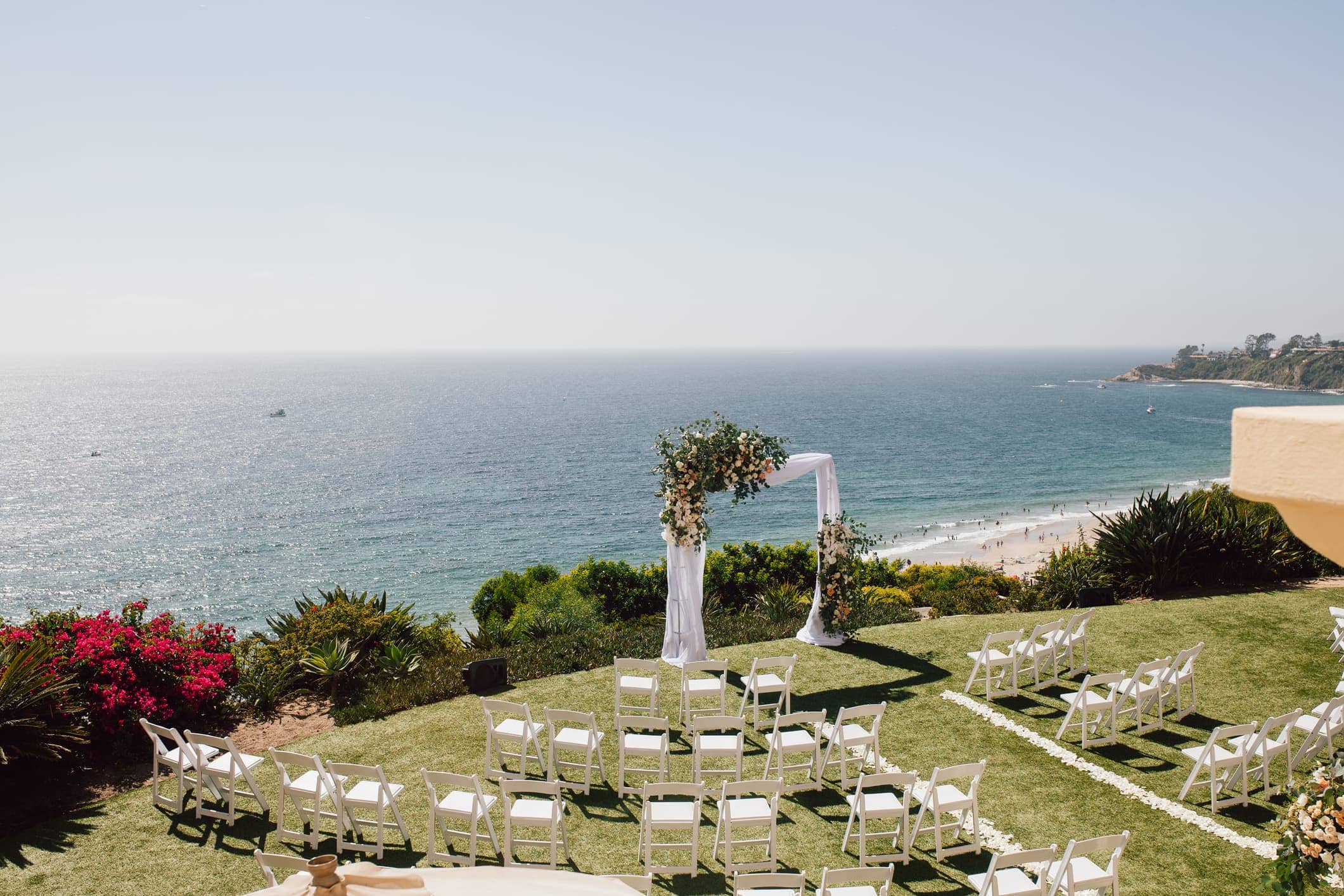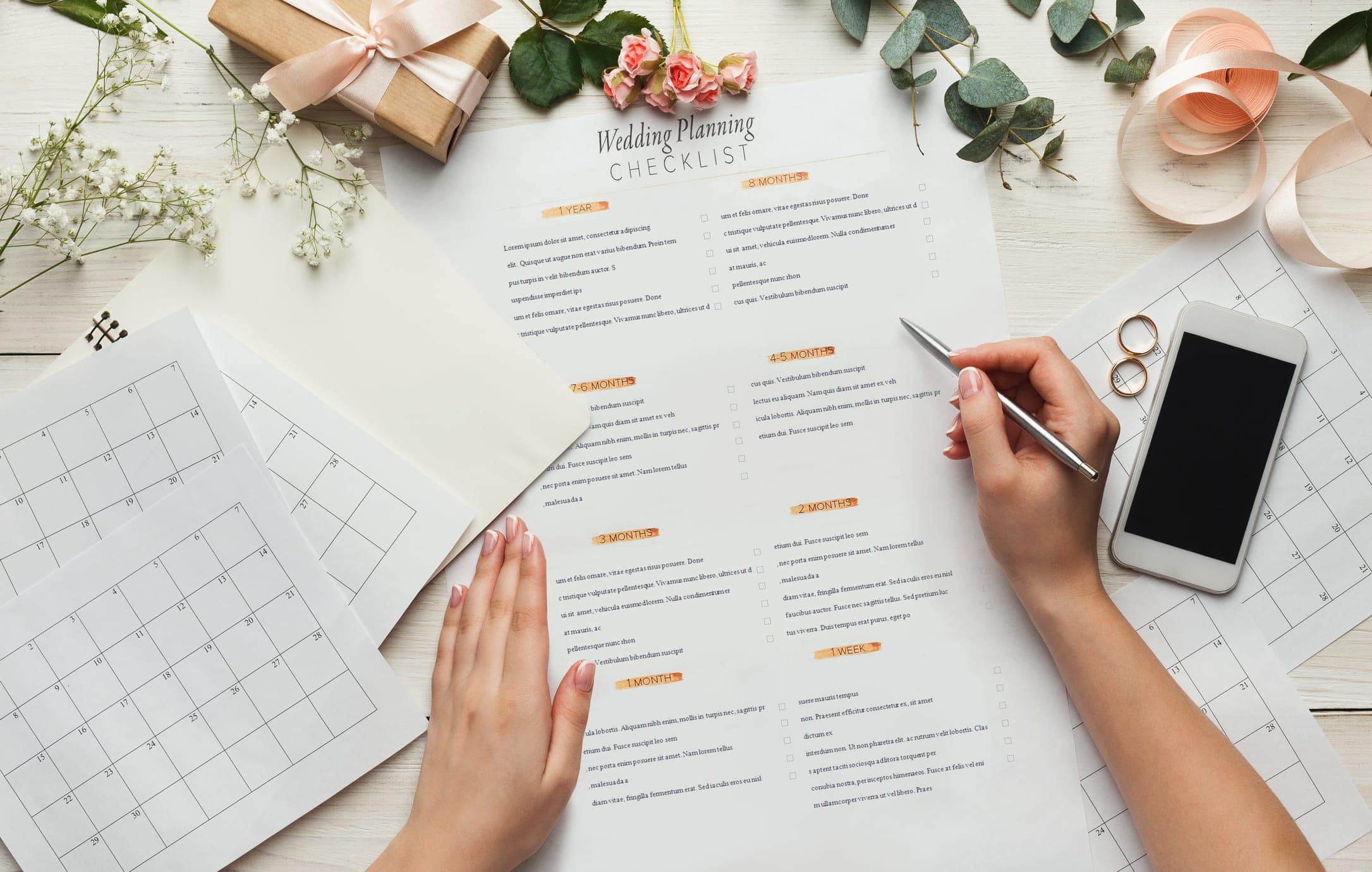Whether you’re hosting a blowout wedding weekend or a small formal ceremony, you’re probably planning on throwing a rehearsal dinner for your VIPs. Here’s how to make the most of yours.
What is the rehearsal dinner?
Traditionally, the rehearsal dinner was a formal dinner held the night before the wedding, attended by everyone in the wedding party and immediate family members. They were hosted by the parents of the groom and intended to give the families a time to come together as one.
Many rehearsal dinners still follow this traditional format, but, as with all things wedding-related, modern couples are making rehearsal dinners all their own.
Wedding rehearsal dinner etiquette
As the couple, it’s your prerogative to plan a rehearsal dinner however you like, but you may be wondering what the expected etiquette is. Below we answer the top FAQ people have about rehearsal dinners.
Who hosts the rehearsal dinner?
Traditionally, the bride’s family hosts the wedding and the groom’s family hosts the rehearsal dinner. Today, however, it can be whomever you want — one of your parents, both parents, you and your partner, or all of the above!
Who pays for the rehearsal dinner?
Again, traditional etiquette dictates that the groom’s family pays for the rehearsal dinner, since the bride’s family pays for the wedding. But with weddings being increasingly expensive these days, it can be anyone who offers.
Typically, the people who host the dinner also pay for it. The key thing is to determine who’s hosting (and who’s paying) well ahead of the rehearsal dinner. Discuss this as a couple and with both of your families to prevent drama.
When is the rehearsal dinner?
For traditional weddings, the rehearsal dinner is hosted the night before the wedding, directly after the rehearsal ceremony. If there is no rehearsal, the night before the wedding is still the assumed date. However, you can host the rehearsal dinner on any evening in the days leading up to your wedding.
Where should you hold the rehearsal dinner?
Ideally, the rehearsal dinner venue should be in the same part of town as your ceremony, so guests don’t have to travel too far. At most, the rehearsal dinner shouldn’t be more than 45 minutes away. If you have a lot of guests coming in from out of town, consider providing transportation to and from their hotel and the rehearsal dinner if you have extra budget.
Who should you invite to the rehearsal dinner?
It’s assumed that everyone in the wedding party, along with immediate family, are invited to the rehearsal dinner. It’s also a nice gesture to invite anyone from out-of-town, since they’ve traveled so far. Additional invites may include the officiant, ushers, ring bearer, flower girl, and plus-ones of anyone in the wedding party.
How do you invite someone to a rehearsal dinner?
Good news: rehearsal dinner invites aren’t expected to be as formal or official as the wedding invites. You can even invite people in person or by phone call. To prevent confusion, though, it’s best to have an official guest list and invite them the same way, whether by snail mail or email. That way, everyone stays in the loop.
When should you send rehearsal dinner invitations?
Invite your guests at least four to six weeks ahead of the rehearsal dinner. You could even include the rehearsal dinner invite along with the wedding invite. You want to give guests enough time to RSVP so you can have an accurate headcount. In your invitation, include the dress code and offer directions for getting to the rehearsal dinner.
How formal is the rehearsal dinner?
It’s up to you. You may choose to keep the theme of your rehearsal dinner in line with the rest of your wedding, which may be formal or informal. Or, you may decide to switch it up, and pair an informal gathering with a traditional ceremony, or vice versa.
How long should the rehearsal dinner be?
Two to three hours is a typical length for a rehearsal dinner. You can budget about 30 minutes for people to arrive and get settled, 60 to 90 minutes to eat, and another 30 minutes for speeches, gift-giving, or anything else on your agenda.
How to plan a wedding rehearsal dinner
Now that you’ve brushed up on your wedding rehearsal dinner etiquette, it’s time for the fun part: planning! Follow these ten steps.
- Decide who’s hosting. Traditionally, the groom’s parents foot the bill, but you can decide what works for you, your families, and your budget. If the parents are paying for the wedding, the couple may choose to cover the cost of the rehearsal dinner.
- Determine your budget. Once you know who’s paying, figure out how much you can afford. If you have a smaller budget, consider inviting fewer people, hosting a potluck, or choosing a venue with a BYOB policy.
- Choose a theme. Your rehearsal dinner kicks things off, so let it set the tone of your wedding weekend! Choose a theme that represents the two of you as a couple. Fun rehearsal dinner ideas include a classy cocktail hour, backyard barbeque or potluck, beach bonfire, or taco night.
- Book a venue. If you’ve booked a larger wedding venue, you might see if they have another space you can use for your dinner. You could also host the dinner at one of your family’s homes, a favorite restaurant, or another place that’s special to you as a couple. Start researching options for event insurance. Most official venues will require you to have a policy for the evening.
- Make your guest list. It’s expected that the wedding party and immediate family attend the rehearsal dinner, along with their plus-ones. If you have extra budget, you can also include out-of-town guests, or open it up to everybody.
- Set a date and time. Rehearsal dinners are typically held the night before the wedding, after the ceremony rehearsal (if there is one). To figure out your start time, budget 45 minutes for the rehearsal, and add in however long it takes to drive to the dinner venue. A start time of 7 to 8 is typical.
- Figure out the menu. For more intimate rehearsal dinners, a dinner is appropriate. If you are hosting a larger affair, you can keep it to cocktails and appetizers or desserts. Consider a menu that reflects your backgrounds, or incorporates local fare. Be aware of any dietary requirements for your guests.
- Figure out the entertainment. Rehearsal dinners are a time for everyone to come together and get to know each other prior to the ceremony. Background music is nice, but you don’t need a DJ. You may, however, want a mic so guests can make a toast. It’s also traditional for the couple to make a short speech to thank everyone.
- Prepare gifts. Speaking of thank yous, the rehearsal dinner is also the time when the couple gives gifts to their wedding party.
- Have fun! Let this be a time to celebrate your nuptials with everyone you love. Do your best to spend at least a few minutes with every guest. Introduce people to each other so they can feel at ease going up to each other the next day at the ceremony. Finally, end the evening with any logistical reminders for the big day.
Planning your rehearsal dinner timeline
Using the checklist above as your guide, here’s a good timeline to follow as you plan your rehearsal dinner:
- Nine to twelve months out: After you’ve booked your wedding venue, decide who’s hosting your dinner. Then book a dinner venue (and caterer if needed).
- Six months out: Finalize your guest list and menu. Order invitations.
- Two months out: Send your invites and record the RSVPs.
- Two weeks out: Notify the venue of your final head count. Work up a seating chart, and purchase name cards if needed.
Finally, make sure you can enjoy the evening by knowing you’re protected from liability in case things go wrong. Most venues require couples to provide proof of insurance coverage for rehearsal dinners. Thimble’s Event Insurance offers policies by the hour, so you can purchase coverage for just when you need it. It doesn’t get more affordable than that.










